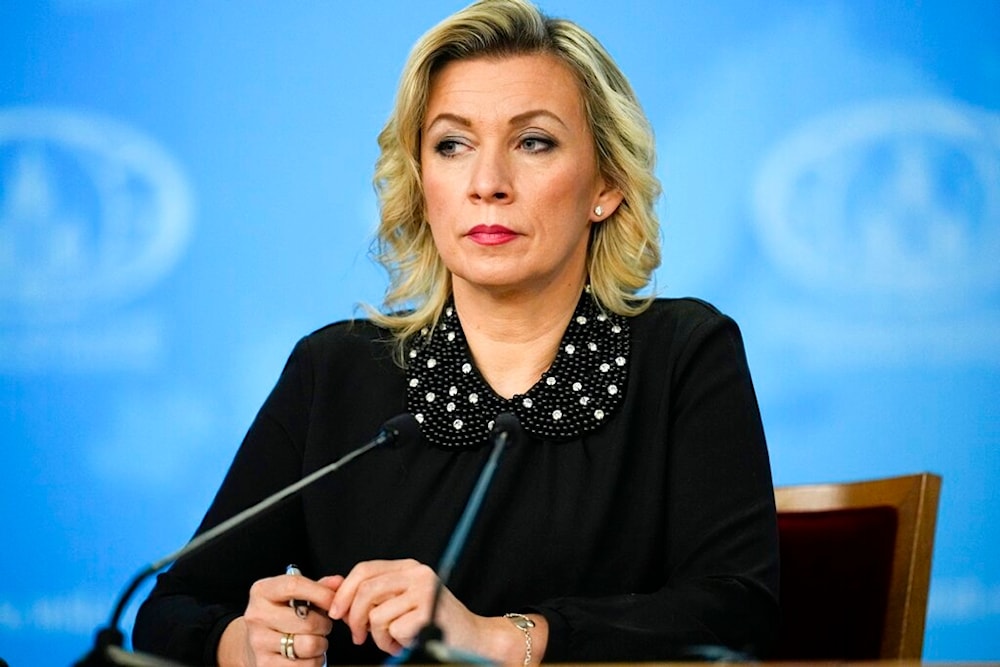Global pressure forces West to condemn Moscow terror attack: Zakharova
The West initially planned not to condemn the terrorist attack but rather to confine its response to vague expressions of regret and sympathy.
-

Russian Foreign Ministry spokeswoman Maria Zakharova attends Russian Foreign Minister Sergey Lavrov's annual news conference in Moscow, Jan. 18, 2023. (AP)
Russian Foreign Ministry spokeswoman Maria Zakharova stated on Saturday that the majority of the global community has compelled the West to revise its rhetoric regarding the terrorist attack at Crocus City Hall, leading them to condemn the act rather than merely expressing condolences.
"The global majority has literally forced them [the West] to change their rhetoric, and even throughout yesterday evening and overnight, they were hastily rewriting their press releases. This morning, we even started to receive additional signals from Western countries that they will definitely strengthen their rhetoric [regarding the terrorist attack]," Zakharova said on the Rossiya 24 TV channel.
The West initially planned not to condemn the terrorist attack but rather to confine its response to vague expressions of regret and sympathy, the spokeswoman added.
Read more: Suspect admits shooting people at Moscow's concert venue for money
A terrorist shooting took place on Friday evening at the Crocus City Hall concert venue in Krasnogorsk, located just outside Moscow, followed by a large-scale fire. An observer from Sputnik who was present during the incident recounted that a minimum of three individuals wearing camouflage attire forcibly entered the music hall, shooting at people from close range and hurling incendiary devices.
As per the most recent information from the Russian Investigative Committee, the terrorist attack claimed the lives of at least 134 individuals, with numerous others sustaining injuries. Authorities anticipate that the death toll will rise as further assessments are conducted, Moscow Region Governor Andrei Vorobiev said on Saturday.
The Russian Federal Security Service (FSB) announced the detention of eleven individuals in connection with the attack, including four directly implicated in the incident. According to the FSB, all four suspects were apprehended in the Bryansk region of Russia, which shares a border with Ukraine, within a few hours of each other.
In the aftermath of the terrorist attack, several countries issued statements expressing strong condemnation of the heinous act. Among these countries are Iran, Egypt, Cuba, Italy, Belarus, Syria, Serbia, and Pakistan, among many others. All of these contributed to exerting pressure on the West to adjust its press releases, as per Zakharova.
Prior intel
On March 8, a report by The Telegraph revealed that both the UK and US embassies in Russia sent out a warning that a terrorist attack could happen in Moscow within the next 24 hours.
The warning initially issued by the US embassy was reiterated by the UK's embassy, advising American citizens to steer clear of large gatherings for the next 48 hours. It stressed that it is "monitoring reports that extremists have imminent plans to target large gatherings in Moscow, to include concerts".
The embassy further sent an advisory to its citizens to “monitor local media for updates” and “be aware of your surroundings”.
The news came a day after Russia’s Federal Security Service (FSB) reported that its agents had dodged a potential ISIS terrorist attack on a Moscow synagogue, with state-owned media claiming those plotting the attackers were killed. However, it remains unclear whether these incidents are related.
In reaction to the report, Serbian President Alexandre Vucic told the Prva broadcaster that calls by the US and British embassies to their nationals not to visit shopping malls in Moscow show that their intelligence services had certain information about possible terrorist attacks.
"On March 7, the US Embassy cautioned its citizens against visiting shopping centers. Then the British and some others did the same. This means that their intelligence services wiretapped certain conversations, got information and knew that something would happen," Vucic told the Prva.

 4 Min Read
4 Min Read








